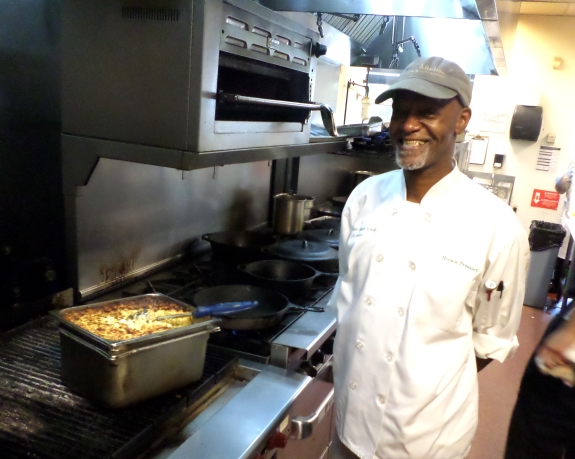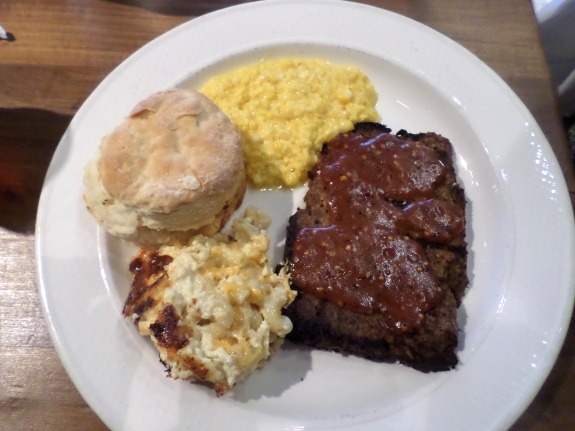by Ray Linville
Food is more than simply sustenance. Kitchens are more than places to prepare and eat meals. No place is better for demonstrating the value in society of food and kitchens than The King’s Kitchen in Charlotte, NC. As its customers enjoy the menu of the day, the unemployed, underemployed, difficult to employ, and recently released prison inmates learn culinary and food service skills.

Customers enter because the food is excellent and the service is top-notch. The Southern meat and three sides (with bread) seems the most popular order. The entrees of braised pot roast, fried or baked chicken, fried catfish, and grilled meatloaf rival any superior Southern restaurant. Customers may also be satisfied because the restaurant has a huge heart and social conscience. When I ate recently at The King’s Kitchen, the food was so good and the service so professional, I couldn’t image that the staff could include someone once homeless, a former drug addict, or convicted felon.
Soup kitchens and food banks are in the spotlight for how they use food to sustain families who need help and are food-insecure, and they provide very valuable services. However, they tackle only one aspect of helping someone who is facing tough times. Equally important is using food to help others live more productively – by learning a food industry skill that makes them employable.

Local food has increasingly garnered its share of attention and emphasis. True to its local mission, The King’s Kitchen’s Southern-inspired cuisine hails from Carolina farms and purveyors. Although connecting local producers and local consumers in a geographic area is important, equally significant is satisfying more than culinary tastes. The restaurant embraces another purpose: to employ a segment of its community “that is considered unemployable, from people who have come out of prison and rehab, to youth that are a high risk from dropping out of school.” It trains them “to run a full-service restaurant from the front to the back.” In doing so, it is also teaching leadership and life skills to transform its employees into community leaders.
Founded in 2010 as a non-profit, The King’s Kitchen also uses all its profits to help feed the needy in the metropolitan Charlotte area. In addition to providing funds, it distributes food to food banks and established feeding centers that then provide meals to the hungry. Last year it prepared almost 26,000 meals to the hungry and poor.

To feed the spiritual needs of its workers, the Christian-themed business works with more than a dozen local ministries. Similar to Habitat for Humanity that is creating decent, safe, and affordable one homeowner at a time, The King’s Kitchen proclaims that it is transforming its community “one plate at a time.”
When I stopped for lunch at The King’s Kitchen, my lifelong fondness of Southern vegetables led me to order the lunch plate of four sides. The menu typically includes black-eyed peas, butter beans, collard greens, garden peas, seared cabbage, creamed corn, sweet potato mash and other sides such as coleslaw, creamed potatoes, potato salad, and mac and cheese.

The mac and cheese, a premier Southern tradition, was so good that I had to meet the chef. When I entered the kitchen, I asked to speak to the person who had prepared it. From the worried looks on the staff’s faces, I could tell they thought that I had a complaint. “Horace Pressley made it,” one person said who pointed to a man several feet away. As I bought my camera into view, I asked Pressley if I could take his picture because his custard-style mac and cheese was phenomenal. The next reaction in the kitchen was as if I had turned the place upside down. Everyone started to laugh. After I had returned to my table, a manager told me that I had made Pressley’s “day” by taking my compliment into the kitchen for everyone to hear.

when someone raves about his mac and cheese.
Other kitchens with local missions also provide culinary training as they feed the hungry, such as Triad Community Kitchen in Winston-Salem, an affiliate of Catalyst Kitchens. This national network works to alleviate problems of unemployment and food scarcity, although its members don’t operate restaurants open to the public like The King’s Kitchen. Because Chef Jim Noble and his wife Karen (the owners whose businesses include restaurants in Winston-Salem and elsewhere in Charlotte) have a passion for food that “feeds a higher purpose,” The King’s Kitchen not only seeks to feed the hungry but also embraces outreach ministries and conducts job training in a pubic restaurant for people who need a second chance.

Food prepared in restaurants is important, not only for enjoyment and nourishment, but can also be a means to alleviate problems of poverty, hunger, and chronic unemployment in a community. As the logo for The King’s Kitchen explains, it’s “a Southern kitchen on a local mission.”
Editors Note: Ray Linville knows his mac and cheese. Check out his NC Food post on Making Mac and Cheese Better with NC Mountain Cheese (March 30, 2015)!
………………………………………………………………………………..
RESOURCES
The King’s Kitchen
129 W. Trade St.
Charlotte, NC 28202
(704) 375-1990
………………………………………………………………………………..
 Ray Linville writes and lectures on regional culture, including foodways and folklife. He has taught in the N.C. Community College System as a professor of English and humanities and served on the board of the N.C. Folklore Society. Read more about Ray’s ramblings at his blog: Sights, Sounds and Tastes of the American South.
Ray Linville writes and lectures on regional culture, including foodways and folklife. He has taught in the N.C. Community College System as a professor of English and humanities and served on the board of the N.C. Folklore Society. Read more about Ray’s ramblings at his blog: Sights, Sounds and Tastes of the American South.
Leave a Reply